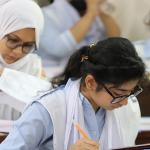The United Arab Emirates has announced a sweeping change to its education system: beginning with the 2025–26 academic year, second-term examinations will no longer be held in schools across the country. This reform is designed to reduce academic stress, modernize evaluation methods, and encourage students to focus on long-term learning rather than short-term memorization.
Why the Change?
For decades, traditional exam systems have placed heavy emphasis on memorization and term-end performance. Education specialists in the UAE have been increasingly advocating for reforms that align with international best practices, where learning is continuous, skill-based, and focused on personal growth.
The decision to abolish second-term exams reflects the UAE’s growing commitment to transform its education system into one that nurtures creativity, problem-solving, and critical thinking. Instead of a single high-stakes test in the middle of the year, students will now be assessed through projects, presentations, assignments, and classroom participation.
Officials note that this shift will particularly benefit younger students, for whom exam stress can often overshadow learning. By reducing pressure, schools can provide an environment where children enjoy learning while still being monitored for steady academic progress.
What Will Replace Second-Term Exams?
The Ministry of Education has outlined a continuous assessment model that will evaluate students’ performance across the school year. This includes:
Project-Based Learning: Students will engage in research, teamwork, and real-world problem-solving.
Classroom Performance: Teachers will track consistency, participation, and understanding in everyday lessons.
Periodic Quizzes: Short, low-stakes tests will be used to check comprehension without the weight of formal exams.
Skill Development: Creativity, innovation, and practical application of knowledge will carry more weight than rote memorization.
End-of-year examinations and standardized international tests will still remain for senior grades, especially those preparing for university admissions, but the overall system will focus less on pressure-filled mid-year exams.
Impact on Students and Parents
For students, the biggest advantage is the reduction of exam-related stress. Many studies highlight that exam pressure at a young age can negatively impact mental health, confidence, and motivation. With the new system, students will have more opportunities to show their strengths over time rather than being judged by a single test paper.
Parents, too, will benefit from a clearer understanding of their child’s performance. Instead of waiting for exam results every few months, they will receive regular progress updates throughout the year. This also encourages stronger communication between parents and teachers, fostering a collaborative approach to a child’s development.
Teachers to Play a Central Role
The new policy puts teachers at the heart of the education system. Educators will now carry greater responsibility in monitoring student progress and guiding them in areas where improvement is needed. To ensure smooth implementation, the Ministry of Education is planning teacher training programs and workshops before the new academic year begins.
Teachers will also be equipped with digital tools to track performance and provide feedback in real-time. This modernized system is expected to increase efficiency, transparency, and fairness in student evaluations.
Part of UAE’s Education Vision 2031
This decision is not an isolated change but part of the UAE’s broader Education Vision 2031, which aims to make the country a leader in innovative, world-class education. The long-term goal is to prepare students for the future economy, where adaptability, creativity, and problem-solving will be far more valuable than memorized facts.
Recent reforms, such as the introduction of artificial intelligence in classrooms, digital learning platforms, and skill-based programs, are all aligned with this future-focused approach. By removing second-term exams, the UAE is signaling its intention to focus more on life skills, innovation, and holistic development.
A Forward-Looking Step
The reform has been welcomed by educators, parents, and policy experts as a positive and progressive move. While some adjustments will be needed to ensure smooth implementation, the long-term benefits are expected to be substantial.
As schools gear up for the 2025–26 academic year, students can look forward to a system that recognizes them for their creativity, curiosity, and consistent effort rather than just their ability to perform in a high-pressure exam setting.
By reshaping assessments, the UAE is once again setting a benchmark for the region, positioning itself as a pioneer in education reforms that place students’ growth and well-being at the center of national development.










